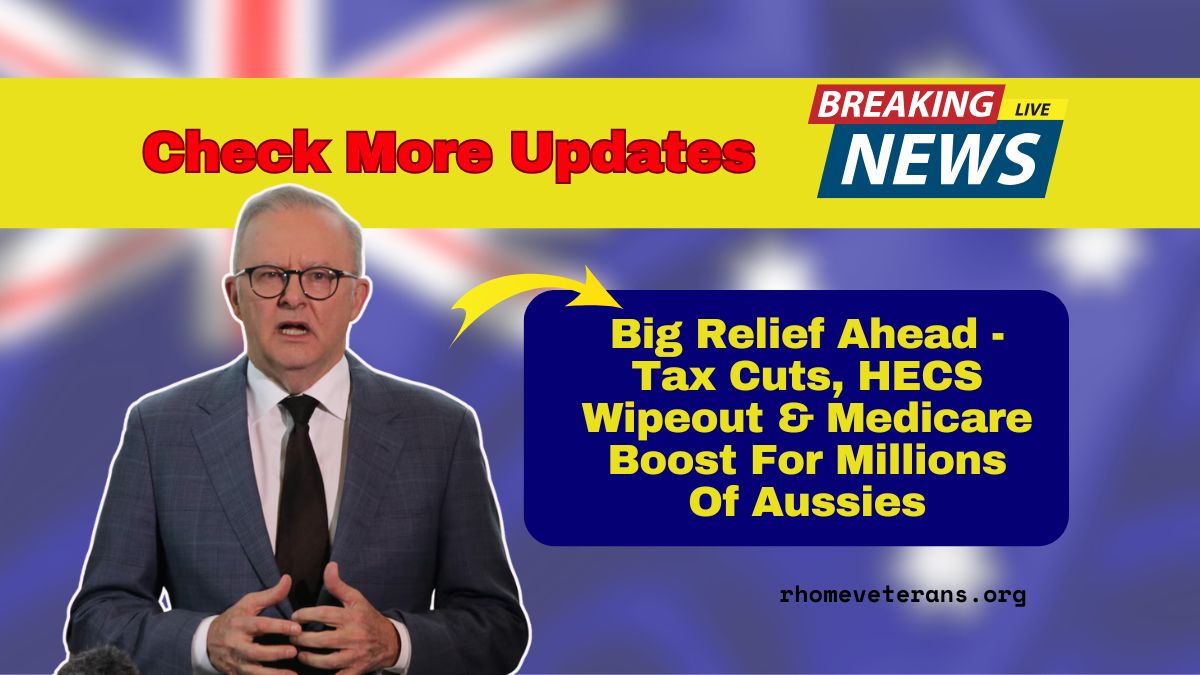In a significant move to alleviate the cost-of-living crisis, the re-elected Albanese government has unveiled a comprehensive package aimed at providing financial relief to millions of Australians. This initiative encompasses tax reductions, student debt relief, energy rebates, and a substantial Medicare enhancement.
Tax Cuts: More Money in Your Pocket
Starting July 1, 2026, the government will implement a series of tax cuts:
- The lowest tax bracket will decrease from 16% to 15%, and further to 14% by July 1, 2027.
- An instant tax deduction of $1,000 will be available from July 1, 2026, allowing taxpayers to claim this amount without itemizing work-related expenses.
These measures are expected to save Australians approximately $5 per week from 2026 and $10 per week from 2027.
HECS Debt Relief: A New Dawn for Students
Effective June 1, 2025, the government will implement a 20% reduction in HECS-HELP debts, benefiting around 3 million Australians.
This move is projected to eliminate approximately $16 billion in student debt. For instance, a graduate with an average debt of $27,600 will see about $5,520 wiped from their balance.
Additionally, the minimum income threshold for mandatory student loan repayments will increase from $54,000 to $67,000 starting July 1, 2025. This change means individuals earning $70,000 will pay around $1,300 less annually in repayments.
Energy Rebates: Easing Household Bills
To combat rising energy costs, the government will provide an additional $150 energy bill rebate to every household and approximately 1 million small businesses starting July 1, 2025. This extension ensures continued support until the end of 2025.
Medicare Boost: Enhancing Healthcare Access
An $8.5 billion investment over four years will significantly enhance Medicare services:
- An additional 18 million bulk-billed GP visits annually.
- Aiming for 9 out of 10 GP visits to be bulk-billed by 2030.
- Training 2,000 new GPs annually by 2028.
- Capping the price of PBS-listed medicines at $25 per script.
- Establishing 50 new urgent care clinics nationwide.
Housing Initiatives: Supporting First-Home Buyers
The government will invest $10 billion to construct up to 100,000 homes, exclusively available to first-home buyers. Key features include:
- Access to 5% deposits without the need for lenders mortgage insurance.
- Expansion of the Help to Buy shared equity scheme, allowing 40,000 homebuyers to co-purchase homes with the government.
Childcare Reforms: Supporting Families
Significant changes to childcare policies include:
- Guaranteed minimum of three days of subsidised childcare.
- Abolishment of the previous ‘activity test’, which required parents to be working or seeking work to access subsidies.
- A $1 billion fund to build and expand approximately 160 childcare centres over four years.
Beer Tax Freeze: Cheers to Savings
Starting August 1, 2025, the alcohol excise on draught beer will be frozen for two years. This measure typically saves consumers about one to two cents per pint at the pub.
Solar Battery Incentive: Powering Sustainable Homes
The $2.3 billion Cheaper Home Batteries Program, launching on July 1, 2025, aims to:
- Reduce the cost of a typical installed battery by 30%, saving around $4,000.
- Encourage the adoption of renewable energy solutions in households.
Tradie Bonus: Boosting the Construction Workforce
Apprentices in construction trades such as bricklaying, electrical work, carpentry, and plumbing will receive a $10,000 cash boost, distributed at various milestones throughout their apprenticeship.
EV Tax Break: Encouraging Sustainable Transportation
Electric and hydrogen-powered vehicles, purchased through a salary packaging program and priced below the luxury car tax threshold of $91,387, will continue to be exempt from fringe benefits tax.
| Measure | Details |
|---|---|
| Tax Cuts | Reduction of tax brackets and $1,000 instant deduction from 2026 |
| HECS Debt Relief | 20% debt reduction and higher repayment threshold from 2025 |
| Energy Rebates | $150 rebate for households and small businesses from July 2025 |
| Medicare Boost | $8.5 billion investment, more bulk-billed visits, capped medicine prices |
| Housing Initiatives | $10 billion for 100,000 homes, expanded Help to Buy scheme |
| Childcare Reforms | Guaranteed subsidised days, $1 billion for new centres |
| Beer Tax Freeze | Two-year freeze starting August 2025 |
| Solar Battery Incentive | $2.3 billion program reducing battery costs by 30% |
| Tradie Bonus | $10,000 for construction apprentices |
| EV Tax Break | Continued FBT exemption for eligible electric vehicles |
The Albanese government’s comprehensive package addresses critical areas affecting Australians’ daily lives.
From financial relief through tax cuts and HECS debt reduction to improved healthcare services and support for sustainable living, these measures are poised to provide substantial benefits to millions across the nation.
FAQs
When will the tax cuts take effect?
The tax cuts are scheduled to commence on July 1, 2026, with further reductions in 2027.
How much HECS debt will be wiped out?
Approximately $16 billion in student debt will be eliminated, benefiting around 3 million Australians.
What is the goal of the Medicare investment?
The $8.5 billion investment aims to increase bulk-billed GP visits, cap medicine prices, and expand healthcare access nationwide.
